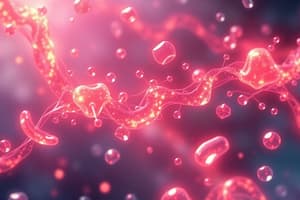Podcast
Questions and Answers
What enzyme do statins competitively inhibit during cholesterol synthesis?
What enzyme do statins competitively inhibit during cholesterol synthesis?
- Cholesterol 7-alpha-hydroxylase
- Lecithin-cholesterol acyltransferase
- Fatty acid synthase
- 3-Methylglutaryl coenzyme A reductase (correct)
Which drug is noted for being more effective at lowering LDL cholesterol?
Which drug is noted for being more effective at lowering LDL cholesterol?
- Fibrates
- Omega-3 fatty acids
- Nicotinic acid
- Statins (correct)
What specific advice is given regarding statin use during pregnancy?
What specific advice is given regarding statin use during pregnancy?
- Safe to use throughout pregnancy
- Use only if necessary
- Discontinue at least 3 months before trying to conceive (correct)
- Continue use until conception
What is a significant recommendation for patients taking statins regarding muscle symptoms?
What is a significant recommendation for patients taking statins regarding muscle symptoms?
In which situation would a statin be indicated for a patient?
In which situation would a statin be indicated for a patient?
For how long should contraception be used after stopping statin treatment?
For how long should contraception be used after stopping statin treatment?
Which other lipid-lowering drug is noted for effectively lowering triglycerides?
Which other lipid-lowering drug is noted for effectively lowering triglycerides?
What risk is associated with statin use during breastfeeding?
What risk is associated with statin use during breastfeeding?
What is the maximum dose of simvastatin when administered with amlodipine?
What is the maximum dose of simvastatin when administered with amlodipine?
Which of the following is monitored before starting a statin?
Which of the following is monitored before starting a statin?
Which medication is noted to increase the risk of rhabdomyolysis when taken with statins?
Which medication is noted to increase the risk of rhabdomyolysis when taken with statins?
How is heart failure classified based on the amount of blood the heart pumps out with each heartbeat?
How is heart failure classified based on the amount of blood the heart pumps out with each heartbeat?
What is the key characteristic symptom of heart failure during exercise?
What is the key characteristic symptom of heart failure during exercise?
What is a common side effect to monitor in patients starting statins due to potential liver issues?
What is a common side effect to monitor in patients starting statins due to potential liver issues?
Which of these is NOT a symptom of heart failure?
Which of these is NOT a symptom of heart failure?
What aspect of heart failure does the term 'clinical syndrome' refer to?
What aspect of heart failure does the term 'clinical syndrome' refer to?
What is the maximum dose of simvastatin recommended when taken with amlodipine?
What is the maximum dose of simvastatin recommended when taken with amlodipine?
Which of the following statins can be taken any time of day?
Which of the following statins can be taken any time of day?
What is the primary dose of atorvastatin for patients at high risk of cardiovascular events?
What is the primary dose of atorvastatin for patients at high risk of cardiovascular events?
What is the main side effect of statins that is related to muscle issues?
What is the main side effect of statins that is related to muscle issues?
What risk is associated with simvastatin at a dose of 80 mg?
What risk is associated with simvastatin at a dose of 80 mg?
What must be monitored when taking high intensity statins concurrently with certain drugs?
What must be monitored when taking high intensity statins concurrently with certain drugs?
Which combination of medications requires specific dose adjustments due to myopathy risk?
Which combination of medications requires specific dose adjustments due to myopathy risk?
What is the recommended frequency for increasing the dose of atorvastatin if needed?
What is the recommended frequency for increasing the dose of atorvastatin if needed?
What is the primary contraindication for both eplerenone and spironolactone in patients with heart failure?
What is the primary contraindication for both eplerenone and spironolactone in patients with heart failure?
Which type of acute coronary syndrome (ACS) is characterized by complete obstruction of a coronary artery?
Which type of acute coronary syndrome (ACS) is characterized by complete obstruction of a coronary artery?
Which symptom is NOT typically associated with angina?
Which symptom is NOT typically associated with angina?
In which scenario does unstable angina most likely occur?
In which scenario does unstable angina most likely occur?
Which form of ACS is considered the least severe?
Which form of ACS is considered the least severe?
What distinguishes angina from a myocardial infarction (MI)?
What distinguishes angina from a myocardial infarction (MI)?
What is the primary cause of acute coronary syndrome (ACS)?
What is the primary cause of acute coronary syndrome (ACS)?
In terms of management, what is typically used for long-term management of stable angina?
In terms of management, what is typically used for long-term management of stable angina?
What blood pressure range characterizes Stage 1 hypertension in a clinical setting?
What blood pressure range characterizes Stage 1 hypertension in a clinical setting?
At what clinic blood pressure level do we classify Stage 2 hypertension?
At what clinic blood pressure level do we classify Stage 2 hypertension?
Which of the following is true regarding accelerated hypertension?
Which of the following is true regarding accelerated hypertension?
How often should individuals with no target organ damage have their blood pressure monitored?
How often should individuals with no target organ damage have their blood pressure monitored?
What is the protocol for prescribing blood pressure medication for Stage 1 hypertension?
What is the protocol for prescribing blood pressure medication for Stage 1 hypertension?
What are significant signs of someone experiencing accelerated hypertension?
What are significant signs of someone experiencing accelerated hypertension?
What is the first step to confirm a diagnosis of hypertension after initial clinical readings?
What is the first step to confirm a diagnosis of hypertension after initial clinical readings?
What must be investigated urgently if someone has severe hypertension without obvious symptoms?
What must be investigated urgently if someone has severe hypertension without obvious symptoms?
Flashcards are hidden until you start studying
Study Notes
Lipid Lowering Drugs
- Fenofibrate combined with a statin is effective for high triglycerides.
- Nicotinic acid lowers both triglycerides and LDL cholesterol concentration.
- Statins are primarily effective at lowering LDL levels.
- Fibrates are specifically designed to reduce triglycerides, while nicotinic acid reduces both triglycerides and LDL.
Mechanism of Statins
- Statins inhibit HMG CoA reductase, a key enzyme in cholesterol synthesis in the liver.
Statins in Younger Patients
- Considered in cases of familial hypercholesterolemia, a genetic disorder leading to high cholesterol levels.
Safety of Statins in Pregnancy and Breastfeeding
- Statins should be avoided during pregnancy; discontinue 3 months before conception to prevent congenital anomalies and ensure adequate cholesterol synthesis for fetal development.
- Adequate contraception is advised during treatment and for 1 month afterward.
- Statins should also be avoided during breastfeeding.
Patient Advice for Statins
- Patients should report unexplained muscle pain, tenderness, or weakness, as these may indicate rhabdomyolysis.
Indications for Statins
- Indicated for primary and secondary prevention of cardiovascular disease (CVD).
- Recommended for patients with a family history of hypercholesterolemia and primary hypercholesterolemia.
Dose Adjustments for Statins
- Required when there is a risk of myopathy, especially when combined with certain drugs.
- Specific maximum doses for combinations include:
- Simvastatin and amlodipine: 20 mg
- Rosuvastatin and clopidogrel: 20 mg
- Other listed combinations vary (e.g., simvastatin's dose with fibrates and rate-limiting calcium channel blockers).
Side Effects of Statins
- Common side effects include sleep disorders, nausea, diarrhea, constipation, and headache.
Statins Administration Timing
- Atorvastatin and rosuvastatin can be taken at any time of day.
Atorvastatin Dosing
- Primary prevention: 20 mg once daily, increased up to 80 mg.
- Secondary prevention: typically 80 mg once daily.
MHRA Warning for Statins
- Simvastatin (80 mg) carries a risk of rhabdomyolysis. Caution advised when combined with amlodipine (>20mg is risky).
Monitoring Before and After Statin Treatment
- Initial tests include a full lipid profile, TSH, renal function, creatinine kinase, and liver function tests.
- Follow-up monitoring includes checking lipid levels and liver function tests within 3 months and again at 12 months.
Drug Interactions with Statins
- Some medications increase the risk of rhabdomyolysis (e.g., amiodarone, colchicine, nicotinic acid).
- Others may elevate hepatotoxicity risk (e.g., carbamazepine).
- Antibiotics like clarithromycin and substances like grapefruit juice may increase simvastatin exposure.
Heart Failure Overview
- Defined as a clinical syndrome with structural or functional abnormalities leading to reduced cardiac output.
Classification of Heart Failure
- Classified as chronic or acute based on symptom onset.
- Further classified by ejection fraction as preserved or reduced.
Symptoms of Heart Failure
- Shortness of breath (SOB), persistent coughing, wheezing, and ankle swelling caused by pulmonary edema.
Aldosterone Antagonists for Heart Failure
- Eplerenone and spironolactone are used; both contraindicated in hyperkalemia.
- Spironolactone is also contraindicated in Addison's disease and anuria.
Types of Acute Coronary Syndrome (ACS)
- STEMI: ST-elevation myocardial infarction; complete obstruction.
- NSTEMI: Non-ST elevation myocardial infarction; partial obstruction.
- Unstable Angina: Unpredictable angina that may occur at rest.
Differences Between Angina and Heart Attack
- Angina results from partial blockage, while a myocardial infarction indicates complete blockage.
Causes of ACS
- Caused by atherosclerotic plaque leading to blockages and consequent myocardial cell death.
Severity Ranking of ACS Types
- Most severe: STEMI.
- Mid severity: NSTEMI.
- Least severe: Unstable angina.
Symptoms of Angina
- Chest pain, discomfort radiating to the arm, neck, or jaw, triggered by exertion or stress, and relieved by rest.
Stable vs. Unstable Angina
- Stable angina: Pain during exertion, predictable, resolves with rest.
- Unstable angina: Pain during rest, unpredictable, longer lasting.
Management of Myocardial Infarction and Unstable Angina
- Initial management involves medications and lifestyle changes, including antiplatelet drugs.
Stages of Hypertension
- Stage 1: Clinic BP 140-159/90-99 mmHg.
- Stage 2: Clinic BP ≥160/100 mmHg.
- Stage 3: Clinic BP ≥180/120 mmHg.
Accelerated Hypertension
- Severe hypertension often over 180/120 mmHg with signs of retinal hemorrhage requiring immediate medical attention.
Diagnosis of Hypertension
- Confirmed by clinical BP readings followed by ambulatory or home BP monitoring if necessary.
Monitoring Blood Pressure
- Patients with no hypertension should have checks every 5 years; if nearing hypertensive levels, checks should be more frequent.
Initiating Blood Pressure Medications
- Medications are started in Stage 2 hypertension (≥160/100 mmHg) irrespective of organ damage.
Signs of Accelerated Hypertension
- Signs include retinal haemorrhage, papilloedema, and may present with eye pain.
Evaluation for Severe Hypertension
- Immediate investigation is required in asymptomatic patients with severe hypertension.
Studying That Suits You
Use AI to generate personalized quizzes and flashcards to suit your learning preferences.



